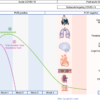A person’s IQ during high school is predictive of alcohol consumption later in life, according to a study by UT Southwestern Medical Center researchers published in Alcohol and Alcoholism. Participants with higher IQ levels were significantly more likely to be moderate or heavy drinkers, as opposed to abstaining.
“We’re not saying that your IQ in high school controls your destiny,” said senior author E. Sherwood Brown, M.D., Ph.D., M.B.A., Distinguished Teaching Professor of Psychiatry and in the Peter O’Donnell Jr. Brain Institute at UT Southwestern.
“But IQ levels could lead to intervening social factors that influence drinking, and it’s an important mechanism to explore. Higher IQ seemed to predict a greater likelihood of being a moderate or heavy drinker but not a binge drinker.”
Although Dr. Brown and UTSW colleagues have conducted numerous studies about alcohol use disorder, he said this is the first to examine predictors of drinking patterns.
Alcohol consumption is on the rise among adults, with excessive drinking linked to high blood pressure, cancer, stroke, and other diseases as people age. At the same time, Dr. Brown explained, some research comparing abstinence with moderate drinking has found a link between cognitive ability and future alcohol use.
“That led me to wonder, if alcohol influences cognition, could cognition affect alcohol consumption?” he said.
To find the answer, Dr. Brown and UTSW colleagues turned to data from the Wisconsin Longitudinal Study, a dataset composed of IQ and lifestyle information from more than 10,000 Wisconsin high school seniors beginning in 1957. The participants were born around 1939.
UTSW researchers used a random sample of 8,254 survey participants who answered questions about their drinking habits in 1992 and 2004, when they would have been about 53 and 65 years old. Moderate drinking was categorized as 1 to 29 drinks per month for women and 1 to 59 drinks for men, and heavy drinking as 30 drinks or more per month for women and 60 drinks or more for men. Those with higher IQs were less likely to binge drink, measured at five or more drinks in one session.
The researchers found that for every one-point increase in IQ, there was a corresponding 1.6% increase in the likelihood that respondents reported moderate or heavy alcohol use.
Income level partially influenced the relationship between IQ and drinking habits, potentially because higher IQ may lead to stressful jobs or more opportunities for social drinking among high earners.
“While it’s not possible to capture all the underlying mechanisms that mediate the relationship between drinking and IQ, we know that income partially explains the pathway between the two,” said study co-author Jayme Palka, Ph.D., Assistant Professor of Psychiatry.
Men reported more binge-drinking episodes than women, supporting previous studies showing men are more likely to engage in hazardous drinking patterns than women.
Because the Wisconsin Longitudinal Study consisted of 99% white non-Hispanic participants, the research team emphasized the need for further research with a more diverse sample.
More information:
Natalie Druffner et al, IQ in high school as a predictor of midlife alcohol drinking patterns, Alcohol and Alcoholism (2024). DOI: 10.1093/alcalc/agae035
Provided by
UT Southwestern Medical Center
Citation:
Researchers find high school IQ predicts drinking habits (2024, October 10)



